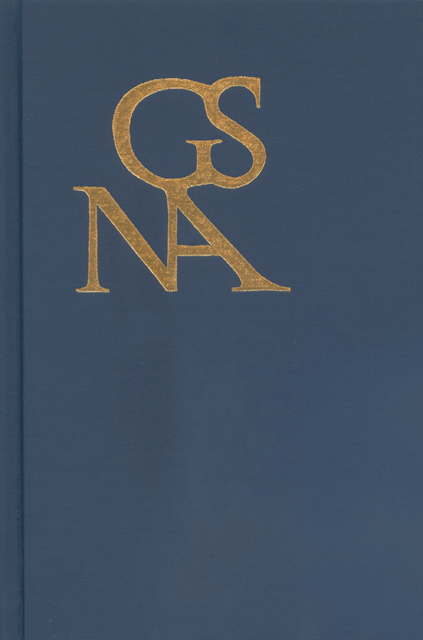Book contents
- Frontmatter
- Contents
- Thomas P. Saine (1941–2013)
- On the Logic of Change in Goethe’s Work
- Space and Place in Goethe’s “Alexis und Dora”
- Countermemory in Karoline von Günderrode’s “Darthula nach Ossian”: A Female Warrior, Her Unruly Breast, and the Construction of Her Myth
- Bad Habits of the Heart: Werther’s Critique of Ill Humor in the Context of Contemporary Psychological Thought
- Confessions of a Childless Woman: Fictional Autobiography around 1800
- Faust’s Begehren: Revisiting the History of Political Economy in Faust II
- Sacrifice in Goethe’s Faust
- Constructions of Goethe versus Constructions of Kant in German Intellectual Culture, 1900–1925
- Das Innere der Natur und ihr Organ: von Albrecht von Haller zu Goethe
- Die Titelkupfer von Moritz Retzsch zu Goethes Ausgabe letzter Hand
- Zu Goethe und der Islam—Antwort auf die oft aufgeworfene Frage: War Goethe ein Muslim?
- Book Reviews
Countermemory in Karoline von Günderrode’s “Darthula nach Ossian”: A Female Warrior, Her Unruly Breast, and the Construction of Her Myth
Published online by Cambridge University Press: 02 June 2023
- Frontmatter
- Contents
- Thomas P. Saine (1941–2013)
- On the Logic of Change in Goethe’s Work
- Space and Place in Goethe’s “Alexis und Dora”
- Countermemory in Karoline von Günderrode’s “Darthula nach Ossian”: A Female Warrior, Her Unruly Breast, and the Construction of Her Myth
- Bad Habits of the Heart: Werther’s Critique of Ill Humor in the Context of Contemporary Psychological Thought
- Confessions of a Childless Woman: Fictional Autobiography around 1800
- Faust’s Begehren: Revisiting the History of Political Economy in Faust II
- Sacrifice in Goethe’s Faust
- Constructions of Goethe versus Constructions of Kant in German Intellectual Culture, 1900–1925
- Das Innere der Natur und ihr Organ: von Albrecht von Haller zu Goethe
- Die Titelkupfer von Moritz Retzsch zu Goethes Ausgabe letzter Hand
- Zu Goethe und der Islam—Antwort auf die oft aufgeworfene Frage: War Goethe ein Muslim?
- Book Reviews
Summary
Gestern las ich Ossians Darthula, und er wirkte so angenehm auf mich; der alte Wunsch, einen Heldentod zu sterben, ergriff mich mit großer Heftigkeit; unleidlich war es mir, noch zu leben, unleidlicher, ruhig und gemein zu sterben. Schon oft hatte ich den unweiblichen Wunsch, mich in ein wildes Schlachtengetümmel zu werfen, zu sterben. Warum ward ich kein Mann! Ich habe keinen Sinn für weibliche Tugenden, für Weiberglückseligkeit. Nur das Wilde, Große, Glänzende gefällt mir. Es ist ein unseliges, aber unverbesserliches Mißverhältnis in meiner Seele; und es wird und muß so bleiben, denn ich bin ein Weib und habe Begierden wie ein Mann, ohne Männerkraft. Darum bin ich so uneins mit mir.
[Yesterday I read Ossian's Darthula and it had such an agreeable effect on me; the old wish to die a heroic death seized me with great fierceness; it was insufferable to me to be alive still, more insufferable to die a quiet and mediocre death. I have often felt the unfeminine desire to throw myself into the wild throngs of a battle, to die. Why was I no man! I have no appreciation for feminine virtues, for woman's happiness. Only the wild, the great, the glittering pleases me. There is an ill-fated but incorrigible misproportion in my soul: and it will and must remain this way, for I am a woman and have the desires of a man, without male strength. That is why I am so changeable and so divided in myself.]
IN THIS QUOTATION FROM A LETTER written to Gunda Brentano on August 29, 1801, Karoline von Günderrode takes Ossian as an inspiration for her wish to challenge a specific gendered boundary: the boundary excluding women from warfare and glory. The disjuncture between a masculine-gendered mind and a feminine body felt so keenly by Günderrode fuels her fascination and identification with Darthula, a princess turned cross-dressed warrior who dies on the battlefield. Through the many female warriors that Günderrode creates or adapts in her work, she explores what Patricia Simpson terms a “female imaginary identity.” The battlefield functions as an imaginary space to transcend gender difference, allowing women to claim and exercise otherwise traditionally masculine emotions like pride, anger, patriotism, courage, and hatred, a space where notions like heroism can be detached from gender (Simpson 106). Or, as Helene Watanabe-O’Kelly states, it allows women to “imagine a space for themselves in which they can think the unthinkable.” As an imaginary space, at least for female warriors, the battlefield has the potential to overcome the disjuncture between masculine desires and the feminine body. Despite, or perhaps because of, Günderrode's frustration with gendered boundaries, in her 1804 epic poem “Darthula nach Ossian,” the potentially liberating space of the battlefield does not enable a reconciliation of a “masculine” mind and a “feminine” body; it does not erase gendered boundaries. This, however, does not mean that the poem replicates the solidifying notions of gender complementarity that were so pervasive around 1800; as Elisabeth Krimmer states, it does not “construe men and women as polar opposites” (Krimmer 137). In one of the few critical analyses of the poem, Krimmer argues that Günderrode exposes the unreliability of traditional gendered signs and, moreover, that the body becomes an arbitrary sign (Krimmer 137 and 34).
- Type
- Chapter
- Information
- Goethe Yearbook 21 , pp. 39 - 56Publisher: Boydell & BrewerPrint publication year: 2014



